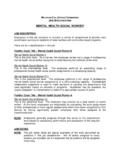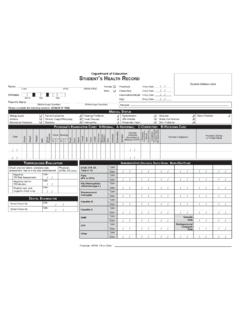Transcription of Recovery Competencies for New Zealand Mental …
1 Recovery Competencies for New Zealand Mental health Workers March 2001 This resource was researched and written for the Mental health Commission by Mary O Hagan. Thanks to Jim Burdett and Jane Briscoe for identifying and writing Recovery competency It is available in hard copy, on disk and on the Mental health Commission s website: Published by the Mental health Commission PO Box 12-479 Wellington Tel 04-474-8900, fax 04-474-8901 email March 2001 ISBN: 0-478-11371-4 Mental health COMMISSION Recovery Competencies , 2001 CONTENTS III Contents Introduction 1 The purpose of this paper 1 What is Recovery ? 1 The origins of Recovery 2 Philosophical foundations of the Recovery approach 2 What are Recovery -based Competencies ? 3 How were the Competencies developed?
2 4 Who and how to use this paper 4 Explanation of Format 6 Section A 7 Recovery Competencies Major categories 7 References applicable to all Competencies 8 Section B 9 Recovery Competencies Major categories, subcategories and examples 9 1 A competent Mental health worker understands Recovery principles and experiences in the Aotearoa/NZ and international contexts 9 2 A competent Mental health worker recognises and supports the personal resourcefulness of people with Mental illness 11 3 A competent Mental health worker understands and accommodates the diverse views on Mental illness, treatments, services and Recovery 13 4 A competent Mental health worker has the self-awareness and skills to communicate respectfully and develop good relationships with service users 15 5 A competent Mental health worker understands and actively protects service users rights 16 6 A competent Mental health worker understands discrimination and social exclusion.
3 Its impact on service users and how to reduce it 18 7 A competent Mental health worker acknowledges the different cultures of Aotearoa/NZ and knows how to provide a service in partnership with them 20 8 A competent Mental health worker has comprehensive knowledge of community services and resources and actively supports service users to use them 22 9 A competent Mental health worker has knowledge of the service user movement and is able to support their participation in services 24 10 A competent Mental health worker has knowledge of family/ whanau perspectives and is able to support their participation in services 26 Section C 28 Resources for Each Sub-category 28 1 A competent Mental health worker understands Recovery principles and experiences in the Aotearoa/NZ and international contexts 28 2 A competent Mental health worker recognises and supports the personal resourcefulness of people with Mental illness 35 3 A competent Mental health worker understands and accommodates the diverse views on Mental illness, treatments, services and Recovery 41 4 A competent Mental health worker has the self-awareness and skills to communicate respectfully and develop good relationships with service users 47 5 A competent Mental health worker understands and actively protects service users rights 50 6 A competent Mental health worker understands discrimination and social exclusion.
4 Its impact on service users and how to reduce it 53 7 A competent Mental health worker acknowledges the different cultures of Aotearoa/NZ and knows how to provide a service in partnership with them 59 8 A competent Mental health worker has comprehensive knowledge of community services and resources and actively supports service users to use them 62 9 A competent Mental health worker has knowledge of the service user movement and is able to support their participation in services 65 10 A competent Mental health worker has knowledge of family/ whanau perspectives and is able to support their participation in services 70 References 74 Print 74 Electronic ordering options 84 Major websites 84 Appendix: The Blueprint on Recovery and Discrimination 87 Mental health COMMISSION Recovery Competencies , 2001 INTRODUCTION 1 Introduction The purpose of this paper This paper is an elaboration of the Recovery principles set out in the Mental health Commission s Blueprint for Mental health Services in New Zealand .
5 It attempts to describe the Competencies Mental health workers need to acquire when using a Recovery approach in their work. The Blueprint is to be fully implemented by the current Government this is a clear signal that the Mental health workforce must be educated and competent in the Recovery approach. An analysis of the training standards and curricula for psychiatrists, comprehensive nurses, diploma level social workers and Mental health support workers showed that there are some gaps in the recognition of Recovery Competencies . The Mental health support workers training standards come the closest to including Recovery Competencies . There was little or no reference in most of these documents to: a Recovery approach the service user movement and service user participation family perspectives and family participation the different understandings of Mental health and Mental illness discrimination, stigma and social exclusion supporting the personal resourcefulness of service users supporting them to develop their relationships and support networks assisting them to make effective use of services and resources.
6 The primary purpose of this paper is to provide educators with guidance on the inclusion of Recovery content in the courses they run for Mental health workers. It does this by outlining the Recovery -based Competencies that need to be reflected in training standards and curricula, and by providing a comprehensive list of resources to support the teaching and learning of the Recovery -based Competencies . The material in this resource is designed to sit alongside existing professional and clinical course content. What is Recovery ? Recovery is defined in the Blueprint as the ability to live well in the presence or absence of one s Mental illness (or whatever people choose to name their experience). Each person with Mental illness needs to define for themselves what living well means to them. The definition is purposefully a broad one, because the experience of Recovery is different for everyone and a range of service models could potentially support Recovery .
7 The Recovery approach requires Mental health services to develop and draw on their own resources, but it also requires that they develop and draw on the resources of people with Mental illness and their communities. Recovery happens when people with Mental illness take an active role in improving their lives, when communities include people with Mental Mental health COMMISSION Recovery Competencies , 2001 2 INTRODUCTION illness, and when Mental health services can enable people with Mental illness and their communities and families to interact with each other. The Recovery approach is more compatible with community-based models of service provision than institutionally-based ones, but it is not a model of service delivery. It is an approach which can be applied to any models that draw on the resources of service users, their communities as well as Mental health services.
8 The origins of Recovery Most of the literature on a Recovery approach for people with major Mental illness comes from the United States and has three main ideological sources. The first is the generic Recovery or self-help movement exemplified by The Power of Positive Thinking , 12-step groups, co-dependency, self-help and new age philosophies. The second source is the Mental health service user movement, and its underlying philosophy of human rights and self-determination. The third source is psychiatric rehabilitation with its focus on community integration and overcoming functional limitations. The Competencies in this paper are more strongly influenced by the service user movement than the generic Recovery movement or psychiatric rehabilitation. The vision of Recovery that comes out of the United States is more individualistic and mono-cultural than many New Zealanders feel comfortable with.
9 The existing Recovery literature tends not to focus as much as it could on discrimination, human rights, cultural diversity or even the potential of communities to support Recovery . As a consequence of this, the Recovery -based Competencies in this paper are more than a rewrite of the existing literature. They are an attempt to redefine Recovery for the contemporary New Zealand context. This is a context where we have the Treaty of Waitangi and the notion of the indigenous people as tangata whenua . New Zealand has a stronger tradition of state provision for the vulnerable and marginalised than the United States, where it tends to be left to the individual to take responsibility for their own needs. We also have a weaker heritage than the United States of the fundamentalist Christian quest for individual salvation that has been secularised there in the last generation through the growth of the generic Recovery movement.
10 And New Zealand communities are perhaps less fractured than they are in the United States. In addition to our wider cultural context, the Like Minds, Like Mine anti-discrimination project has focused some of the attention in the Mental health sector, away from Mental health services and towards the community, as a supporter of Recovery . All this may raise the issue about whether we should use the term Recovery at all. We have retained it because we have not changed the fundamental meaning of Recovery , we have just strengthened some of the dimensions of Recovery which are not fully emphasised in current discussion and literature. The term Recovery provides a container for the Competencies to sit in. But we could equally label that container as the Competencies service users most value, and sometimes find most lacking, in Mental health workers.







